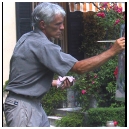The Art Class
- 1 of 6
- next ›
This blog is about what it means to be a creative person, particularly as it relates to painting. But much of what I have to say can be generalized. All human beings are innately creative, even the most uncurious psychopaths. In fact, I would argue that to be human is to be creative. But many of us don’t have the opportunity to be creative and, therefore, many of us do not have the opportunity to be free human beings. And here’s the punch line: among those who don’t have the opportunity to be freely creative, I will argue, are artists themselves. I’m thinking primarily of painters but as I said, the point I will be making can be generalized.
And why is this? I’m getting ahead of my story but here’s a bit of foreshadowing: because much of what artists do is directed by someone else – and for purposes that have little to do with advancing the cause of creativity or human freedom. A great insight that was said by someone (Atisha) over one thousand years ago holds true today: “The greatest wisdom is seeing through appearances.” In other words, if we wish to do anything of substance, especially as it relates to our own emancipation, it behooves us to dig beneath the surface of the way things appear.
I chose the title for this blog, “The Art Class,” because it perfectly captures the two meanings I wish to explore. The first is the kind of art class where a particular art form is taught, a painting or dance class, for example. I will spend sometime writing about these things but more importantly, I will be connecting all of that to another kind of art class. It is the more important sense of class because while it has as much influence over who we are and the kind of work we do as any class focused on “how to,” it remains largely invisible and unexamined. In fact, to move in this direction is taboo – which is all the more reason I wish to do it. We get a glimpse of the art class I have in mind when Eva Cockcroft – a particularly insightful artist who died in 1999 - reminds us that “To understand why a particular art movement becomes successful under a given set of historical circumstances requires an examination of the specifics of patronage and the ideological needs of the powerful.”
There it is. THE NEEDS OF THE POWERFUL. We are not suppose to even think in terms of power or the powerful, let alone identify their source of power and spell out their needs. I feel compelled to do just that, however, because I wish to amplify and provide substance to Robert Henri’s dictum that “art when really understood is the province of every human being.” In other words, my purpose in writing this blog is to get back to the notion that we all put our pants on one leg at a time. Truly great artists are not great because they possess extraordinary talent or skill or win the favor of the jet set or are innovative necessarily; rather they are great because their work liberates and often does so long after they are gone. They do as Beethoven predicted he would do – and like Bacchus, they press out wine for future generations.
Pablo Casals famously said, “Don’t play the notes, play the music.” Of course. Who wouldn’t want to play the music? Yet few of us do. And why is this? Well, for one thing, we first have to master the notes. That’s hard work. It takes years. But harder still is to be profoundly moved by the music and that in turn requires the ability to be profoundly moved by the music of ordinary life. For this, we must be free to feel intensely and authentically, to be who we are most – and that is largely and unavailable condition. Because for so long we have been jumping through hoops and competing for the gold star that the powerful dangle in front of us to meet their needs we are rather clueless as to what we truly like or need. We have long ago forgotten the thrill we got in coming to know our own power as we risked being who we are. This is what Picasso was getting at when he said that it took him only four years to learn to paint like Raphael but it took him a lifetime to learn to paint as a child.
Learning to paint or dance or make music is less learning about new techniques and more about learning new ways to be free. That is no small task.
- Jerry Fresia's blog
- Login to post comments
-




